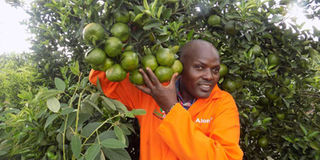Musician strikes right note with sandara

Anthony Ngesa showcases tangerines that he grows in his farm in Machakos. His four-acre farm is home to over 600 mature tangerine trees and another 700 young trees that are at the budding stage. PHOTO | STEPHEN MUTHINI | NMG
What you need to know:
- Ngesa says he inherited it from his father but turned it around in 2008.
- He acquired pheromone traps at Sh350 each that he hangs on trees to protect them from pests.
- To plant, one should dig 2 by 2ft holes and mix soil with manure and fill three quarters of the hole leaving some room for water.
- John Mutua, an agronomist, says tangerines (sandara) are also prone to the greening disease which is caused by a bacteria leading to the mottling and yellowing of leave veins.
A short distance from Mbiuni market in Mwala, Machakos County, at Kyambo, a musician is running a thriving sandara (tangerine) farm.
The farm overlooking the scenic Mbiuni hills is teeming with tangerine fruits, some so heavy that the trees’ branches are breaking under their weight.
“I am happy with the harvest, but its hard task to prop up all the trees so that the branches don’t break,” says Antony Ngesa.
His four-acre farm is home to over 600 mature tangerine trees and another 700 young trees that are at the budding stage.
Further, the musician, who usually entertains people at political rallies and clubs in Mlolongo, has 2,000 seedlings, which he sells at Sh50 each. It has not been an easy task turning the farm to the admirable state it is right now.
Ngesa says he inherited it from his father but turned it around in 2008. He dug trenches across the farm to trap water.
There was a dam nearby, and he initially used donkeys to fetch water for watering the fruits.
But he has since purchased a pump, which he now uses during the dry season. He reaped his first harvest of Sh6,000 after two years. He invested back the money and grew the farm, expanding into seedlings.
Last December, he sold tangerines worth over Sh100,000.
“I sell the fruits at Sh50 per kilo. This time I will sell at Sh60 because not many people have these fruits on their farm this season. One tree produces four crates with each weighing 25kg,” says Ngesa, who works with agronomists to guard against pests like fruit flies and thrips.
He acquired pheromone traps at Sh350 each that he hangs on trees to protect them from pests.
The technology works by trapping male insects that are drawn inside by the female scent.
MULCHING MUST BE DONE
Once inside the trap, the insects die reducing the population since no mating and reproduction takes place.
He also has a beehive on the farm, with the insects helping in pollination of the fruit trees making the oranges sweeter.
Some trees on his farm are three years old while others are a-year-old. The ones currently producing are four-year-old
So, how does he end up with huge fruits? He reveals that the trick lies in watering and controlling pests.
“The trees must be watered once per week during the dry season. Mulching must be done around the roots to retain moisture. The variety I plant has no seeds, therefore, I plant lemon seedlings that I later graft with orange buds before transplanting,” he says.
To plant, one should dig 2 by 2ft holes and mix soil with manure and fill three quarters of the hole leaving some room for water.
Spacing is 4 meters between trees, he offers. He has a word of caution to people who rush into farming to get quick returns thinking it is easy.
John Mutua, an agronomist, says tangerines (sandara) are also prone to the greening disease which is caused by a bacteria leading to the mottling and yellowing of leave veins.
Affected trees bear few fruits or no fruits at all. Fruits also drop prematurely. He says the remedy is to replace affected trees.





